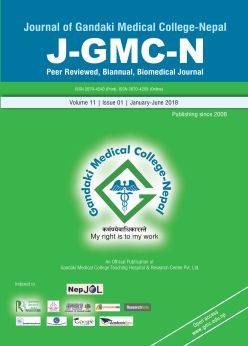Fetal Outcome in Pregnancies Complicated with Polyhydraminos: Study Done in Pokhara, Nepal
DOI:
https://doi.org/10.3126/jgmcn.v12i1.22610Keywords:
Cesarean section, Fetal outcome, PolyhydraminosAbstract
Introduction: Amniotic fluid plays an important role in the development of fetus. Any abnormality in the production amniotic fluid may have adverse effect on the fetus and the mother. Polyhydraminos is one of the common complications occurring during pregnancy and complicates around 0.2 - 2% of pregnancies.
Methods: It is a prospective study conducted in Manipal Teaching Hospital, Pokhara, Nepal from January 2013 to December 2015. All the pregnant ladies irrespective of gestational age with amniotic fluid index (AFI) 25 cm or more were enrolled for the study. According to the AFI, polyhydraminos was classified as mild (25 – 30 cm), moderate (30.1 - 35 cm) and severe (>35 cm). Fetal outcome, mode of delivery, presence of congenital anomalies, NICU admission and maternal glucose intolerance were recorded.
Results: Out of 8232 deliveries, 24 were diagnosed and admitted with the diagnosis of polyhydraminos. Mild polyhydraminos, 50% (n=12) occurred after 37 weeks of gestation and 12.5% (n=3) had severe polyhydraminos. All pregnant ladies 50% (n=12), beyond 37 weeks gestation had cesarean section, whereas 25% (n=6) had vaginal deliveries. 33.3% (n=8) had preterm labor, 12.5% (n=3) had premature rupture of membrane, 25% (n=6) had congenital anomalies, one IUFD, one case of Rh isoimmunisation and one case of twin pregnancy. NICU admission needed in 20.5% (n=5). Pregnant ladies with impaired glucose intolerance were 8.3% (n=2).
Conclusions: Polyhydraminos is associated with increased incidence of cesarean section, preterm labor, fetal malformation and NICU admission.
Downloads
Downloads
Published
How to Cite
Issue
Section
License
This license allows reusers to distribute, remix, adapt, and build upon the material in any medium or format for noncommercial purposes only, and only so long as attribution is given to the creator.




